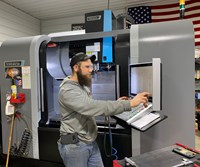The Case For A Chromium-Based Coating
A cutting tool coating based on chromium can take even better advantage of the protective value of aluminum.
Coatings commonly used on cutting tools—TiN, TiCN, TiAlN—tend to include the same two letters. The “Ti” stands for titanium. Now Balzers (Elgin, Illinois) has introduced a coating that represents a departure from this pattern. The new “Alcrona” coating is abbreviated AlCrN, which stands for aluminum chromium nitride. In place of titanium, this coating is based on chromium. According to Balzers technical director Dennis Quinto, Ph.D., the value of the chromium has to do with another element, aluminum.
AlCrN builds on an advantage found in the microstructural properties of high-aluminum TiAlN, which is sometimes represented as AlTiN. This latter coating performs well in high speed, high temperature milling and drilling, specifically because of the amount of aluminum present. The aluminum helps the coating act as a shield against heat. During cutting, it contributes to a layer of aluminum oxide that serves to protect the tool. Thus AlTiN can maintain its wear resistance, low friction and low thermal conductivity at high temperatures where these properties degrade in other coatings. Coating developers have tried to put as much aluminum as possible into the mix for this very reason.
But there is a limit, Dr. Quinto says. Add too much aluminum to the titanium-based nitride composition, and ultimately the crystal structure of the coating will change from cubic to hexagonal lattice. That is, it will change to a structure that has less favorable properties.
Chromium works better, he says. It can hold more aluminum without the structure of the AlCrN changing. The result is a coating that performs even better than AlTiN in many dry and high speed metalcutting applications.
Compared to other coatings, the range of applications of this new coating is broad. It performs effectively in gray and ductile irons, hard and mild alloy steels, and also aerospace metals. But no coating is universal. One set of metals in which AlTiN continues to perform better is the mold steels, which are short-chipping materials with a high hardness that causes abrasive wear. Alcrona does well enough in mold steels, but AlTiN does better. Dr. Quinto says the new AlCrN coating tends to be much better in the difficult-to-cut, tougher alloys in which the chips are longer.

.jpg;width=70;height=70;mode=crop)









.png;maxWidth=300;quality=90)




